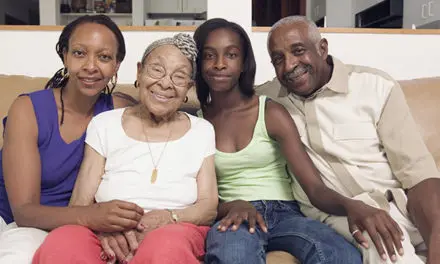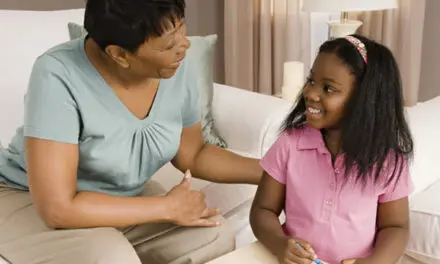Some grandparents take their role above and beyond what is typically expected of them. They see a need and spring into action, putting their own dreams and desires on hold for the sake of others who need them. Gerry and Carole are grandparents—actually, great-grandparents—like that.
When we spoke with Gerry, he shared his life story: He grew up in Texas, the second of four children raised by his mother after his father died when Gerry was only ten. He eventually spent 20 years as a carrier aviator pilot in the Navy. Today, at age 76, he and Carole are devoted to their children, grandchildren, and great-grandchildren.
Because of their upbringing and the importance of family in their lives, Gerry and Carole have been blessed to raise children and grandchildren who are responsible members of society. Yet, like in many large families, there are several who have struggled to find their way. Most notably, one family member fell on hard times because of poor choices, and it ultimately led Gerry and Carole to be thrust into a role they would have never imagined: raising their great-grandson.
Another grandparent had already taken in an older sibling, but couldn’t handle this second baby also, and foster care became a strong possibility for him. Gerry and Carole talked it over. “We don’t have anything else productive going on in our lives right now,” they said, “so let’s just do it. He can come to live with us.” That was eight years ago.
Gerry says it has worked out “fairly well” raising his great-grandson. Those early years found him helping to care for an infant, which he surely never imagined he’d do in his late sixties. The young boy’s difficult situation aroused great sympathy in Gerry, especially during middle-of-the-night crying fits. “I can remember picking that child up and holding him in my arms, sitting on the edge of the bed and just rocking back and forth, because I couldn’t stand to hear him cry. So, I probably bonded with this child more than any of my children or any of my other nine grandchildren, because of the circumstances.”
Needless to say, there are plenty of unique challenges along this journey which Gerry and Carole have chosen to walk. But mostly, their story is about the rewards and the importance of the role that great-grandparents can take when the need arises. “We will probably raise him all the way up through high school and into college,” Gerry says, “if we should live that long.”
Everyday Matters
For now, there are everyday parenting matters to address with their great grandson. When he acts rude or gets ugly during homework sessions, they have to take away his iPad or send him to his room, although he is always quick to apologize and seek forgiveness.
As with many kids today, there is also an ongoing struggle over what he wants and can’t always have. Gerry and Carole, being very committed to a common-sense approach to life and teaching right from wrong, try to their great-grandson grounded, letting him know that the real world is difficult and he needs to stay focused on his education.
Another unique challenge to this journey is that their great-grandson has ADHD—something Gerry had never heard of when he was a parent—so raising him involves keeping up with prescriptions and checking in regularly with teachers to get their perspective on how he’s doing, whether the medications are working as they should, and if there’s any confusion about assignments or due dates. Such details are often missed by the boy, and it shows up at home as well when he’ll leave balls out in the yard, forget his daily responsibilities, or leave his jacket at school.
When it’s time to do homework at the end of the day, Gerry knows that his great-grandson’s medications have worn off by then, and he doesn’t want to keep him on the them all the time, so keeping him focused is a challenge. Reading can be especially frustrating for a child with an attention-deficit issue. Thanks to preschool reading aids, his great-grandson has picked up the basics of reading pretty easily, but the retention was another story. Gerry had similar struggles when he was young, so he can understand reading a paragraph or a chapter and not remembering anything he had just read, because his mind would wander to something else.
Gerry’s solution for this challenge is to be involved every day, and what he has found most effective is reading the materials together. He’ll sit down with his great-grandson and say, “Okay, we’re going to read this book together. You read three or four pages, and I’ll ask you a couple questions about what you just read, and then if you don’t remember, we’ll go back and reread it. Then I’ll read two or three pages.” At first it was a challenge, but soon the boy started catching on more and more. Now, he is making good grades over all, so the extra time, effort and expense are well worth it.
As they play the role of a parent in many ways, Gerry and Carole hold on to long-held convictions about what’s best for their great-grandson, and those convictions often contrast sharply with what they see other children doing. Sure, the boy has an iPad, but they enforce strict limits on when and where he can use it. And since today’s TV shows are much different from what he used to watch in younger years—and in Gerry’s mind, much less wholesome—many evenings they’ll find episodes of “classics” like Andy Griffith or Dick Van Dyke to watch together. Other times, he will want to watch sports on TV, which they let him do in moderation. For Gerry, being retired is an advantage in this area, because he and Carole can tag-team as they’re keeping up with what their great-grandson is doing.
Gerry and Carole understand that being a grandparent and great-grandparent is challenging in today’s world, and their situation reflects that. Gerry also believes grandparents have a responsibility to speak truth to their children about their grandchildren. It isn’t easy or comfortable, and the children may not want to know their parents’ or grandparents’ opinions on raising kids, but if a grandparent sees something going in the wrong direction, Gerry says it’s appropriate to humbly say, “I don’t want to damage our relationship, but as someone who’s older and has seen a lot through the years, there are some things I’m noticing that may not work out the best for you.” Of course, it’s up to the parents to use or ignore the advice, and maintaining a positive and cooperative relationship with them is very important. Each situation and relationship is unique, so it takes wisdom to know the right approach.
“Retirement” … What’s That?
When Gerry and Carole first took on this responsibility, he occasionally thought: I’m retired! We have a place down in Florida where we really enjoy spending time and doing things with friends. But as he thought about the undeniable opportunity to make a positive difference in a family member’s life, he knew he needed to make the sacrifice. Their great-grandson is growing into a fine young man, and playing a huge part in his life brings a lot of joy and satisfaction. “If you do good for people,” says Gerry, “you feel good about it. If you help somebody out, you really get more out of it than they do.” Those feelings have increased exponentially since his own great-grandson is involved.
Today, living in Florida or a luxury senior community would never be Gerry and Carole’s choice. They like being on a street where other kids come around to play and they get to know parents who are in their thirties and forties. For them, even if they weren’t raising a great-grandson, it would be a mistake to miss out on having grandkids and great-grandkids nearby who feel welcome to come and stay for a night or a week, maybe go to a movie, play games together, or just throw the football in the back yard. It’s much harder for children to show interest in their grandparents if the grandparents aren’t involved in their lives.
Gerry says, “I know guys my age who retired, sat down in an easy chair, read the Wall Street Journal and watched a lot of TV. It seems like within three to five years, they had passed on. But here I am jumping up and down fifty times a day raising my great-grandson. Thank God, I’m not working full time, but I sure don’t feel retired.”
Gerry and Carole’s story demonstrates that the more you put into being a grandparent or great-grandparent, the more you’ll get out of it. They believe that wholeheartedly, although it’s easy to forget during the daily grind of raising a boy—helping with homework, attending events, remembering prescriptions, taking him back and forth to see his parents, and giving him the love and discipline he needs.
Every so often Gerry will say to Carole, “We’re helping this child who otherwise would probably be in a very serious situation. We’re doing something right now that’s as important as anything we’ve ever done.” It’s a reminder to himself as much as anything, but Carole feels just the same way.





